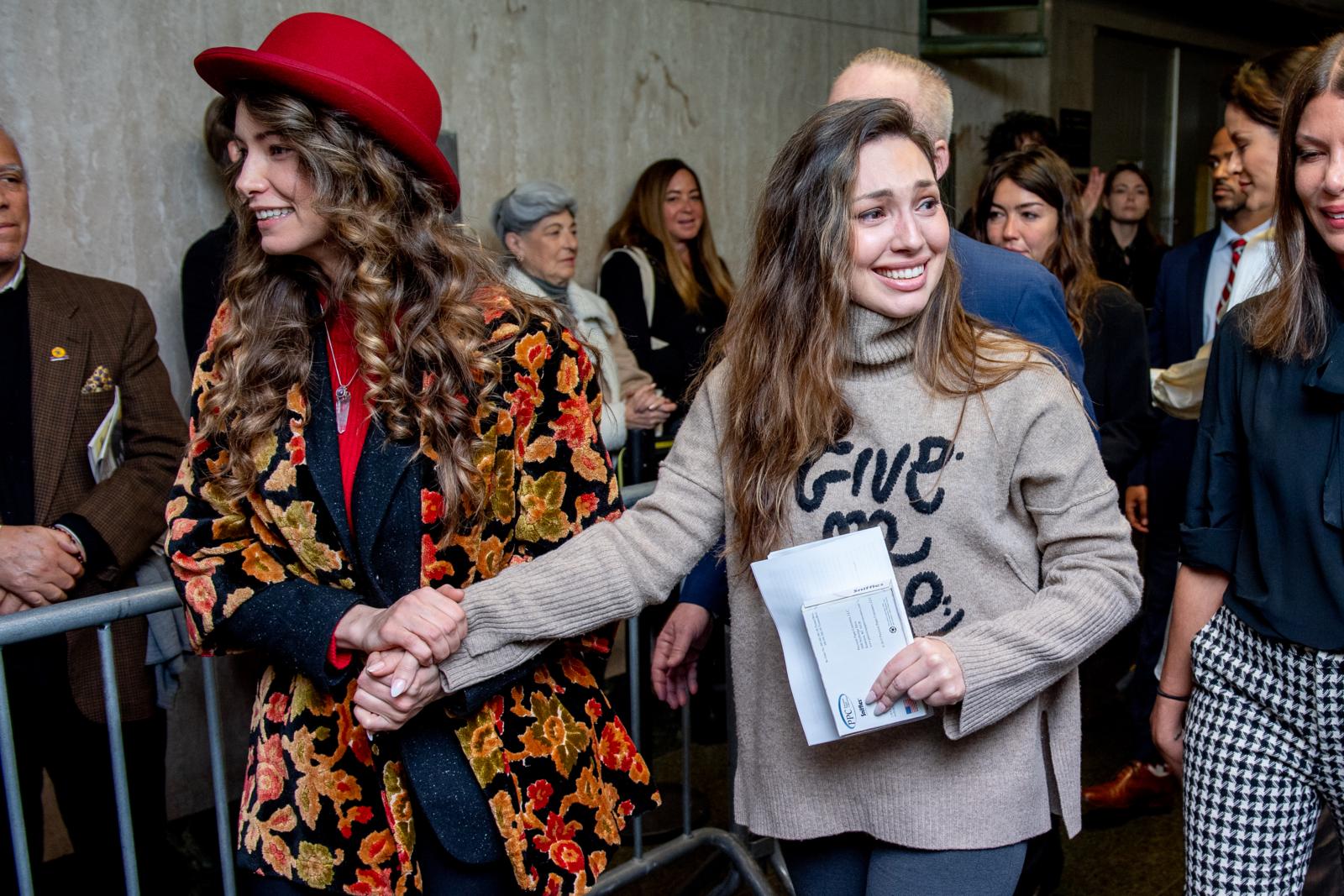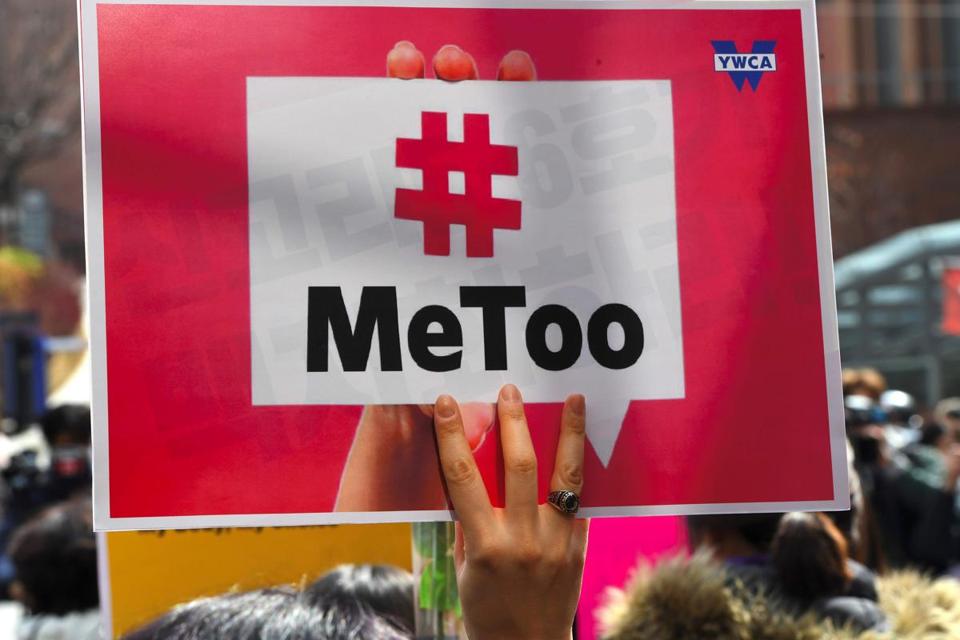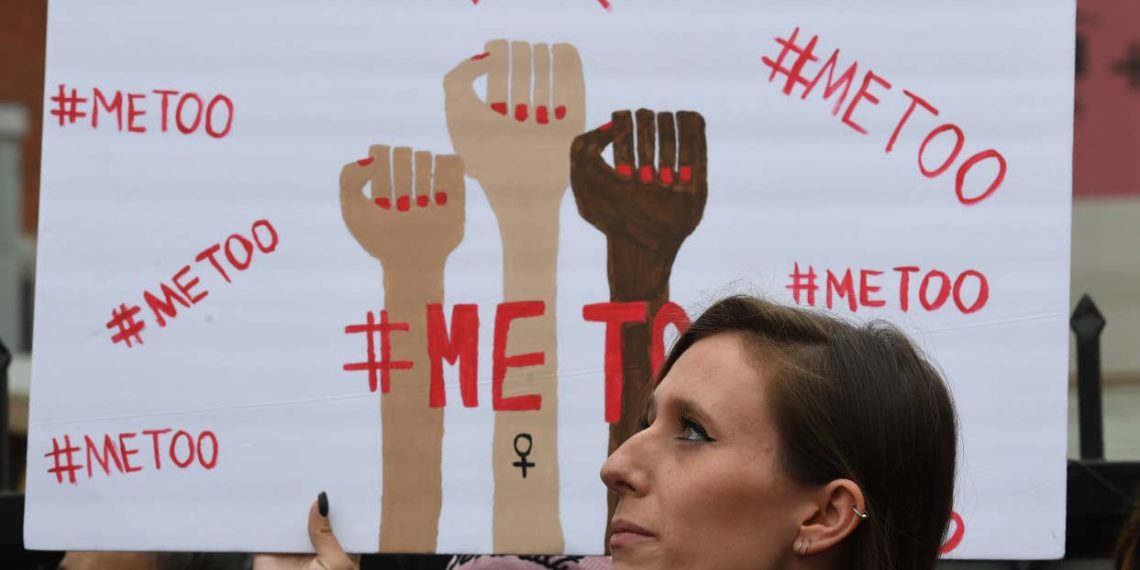Less than two months ago, on February 24, film mogul Harvey Weinstein was convicted to 23 years in prison on sexual assault charges. Today, as the lives of millions are disrupted by the COVID-19 pandemic (and the American producer himself tested positive), it feels closer to two years.
Hundreds of pictures and sketches were shared of what will be remembered as one of the most mediatized trials in modern history. But, especially these days, it is the portraits of Weinstein’s main accusers one cannot stop to look at. They walked into Manhattan’s court as a united group, and united they left on the last day. Two of them, Lauren Young and Jessica Mann, movingly held hands. There were cheers, hugs, and strong and resilient female bodies standing by one another – the sufficient and necessary condition for any feminist revolution.

And in these weeks, when we can no longer hug or march and when it is precisely that physical, bodily component of life and activism that has been taken away from us, those images are more stunning than ever.
Looking back at the Weinstein case makes not only for a powerful reminder that even movements like #MeToo, which intensely relied on digital technology, have an all-important offline dimension that no social media campaign can or should replace. It also has much to teach us and build upon during these strange and painful times.
Pandemic of Violence Against Women
As I write, with forced quarantine causing surges in domestic abuse, trials, including all those involving sexual and gender-based crimes, are suspended to avoid contagion. Yet violence against women is also a pandemic, and when courts are re-opened, many brave souls will return to speak up and ask for justice.
Are they going to be examined on why they agreed to meet with their rapist or didn’t fight when he attacked? Or, as they have been for centuries, on why they didn’t sever their relationship with long-term abusers or reported them earlier on?
During Weinstein’s hearing, defense attorney Donna Rotunno questioned witnesses exactly on that. The same questions were asked to Fiorella, a rape survivor whose ordeal was illustrated an unforgettable 1979 documentary. And to Artemisia Gentileschi, a courageous and talented 17th-century Italian painter who pressed charges against her attacker and was tortured with thumbscrews to verify her testimony.
The tactics used by Rotunno and her team take us far back in the history of misogyny. If survivors are no longer physically brutalized, their suffering and trauma-related symptoms are still exploited to make them fall in contradiction, and their character is still vituperated.
This demonstrates that integrating gender equality and sexual consent into education and professional training of legal personnel is desperately urgent. What, for example, if some of the thousand online courses and conference calls that workplaces are proposing to their employees during self-isolation focused on violence prevention? And what if all those who are generously donating to groups affected by the pandemic also fundraised for the women’s rights organizations that work with survivors and assist them during legal proceedings?
Harmful Narratives About Sexual Violence
The resolution of the Weinstein saga, of course, also entails significant steps forward. Weinstein was found guilty of two of the criminal sex acts he had been accused of and received a lengthy prison sentence – factors that, alone, establish a significant legal and cultural precedent.
Among all the women who accused Weinstein over the last few years, the witnesses heard in Manhattan were not – as put by one of them – “perfect victims.” Some had continued to see Weinstein after the abuse, and a few had other sexual encounters with him.
The defendant was also accused of having forced oral sex on one of them, an act long and infamously labeled as “simply not a rapist-like behavior.” The very fact that prosecutors did not shy away from their stories, once considered “too messy,” is an important cue of how far we have come in demystifying rape myths and bringing the reality of gender-based violence to public attention.
Guys, it's our turn.
After yesterday's endless #MeToo stories of women being abused, assaulted and harassed, today we say #HowIWillChange.
— Benjamin Law 羅旭能 (@mrbenjaminlaw) October 16, 2017
Speaking of shattering harmful narratives about sexual violence, forensic psychiatrist Dr. Barbara Ziv was called to explain how survivors of sexual trauma tend to blame themselves for their victimization, block the very memory of it, and remain in contact with their perpetrator, either for fear of retaliation and shaming or because they cannot (yet) bring themselves to process what they experienced as violence.
In so doing, Dr. Ziv helped shed light on the plaintiffs’ behaviors, her testimony and presence in court counting as both feminist achievements and best future practices.
#MeToo Backlash
If the #MeToo movement made it hard for anyone to ignore the full extent and gravity of violence against women worldwide, the backlash against feminist and awareness-raising initiatives has already started. Over a year ago, prominent public speakers argued that “#MeToo had gone too far.”
During his hearing, Weinstein, echoed by his defense team, claimed to be worried for all the “confused men,” convinced to have engaged in “consensual sex” with “those who now accuse them of rape.” And while educating men to navigate the complexities of sexual consent and getting them involved in feminism is a key part of the work to be done, these claims have been long used to silence survivors and push back against women’s rights.

The other essential task we are facing today is making sure that the anxieties and insecurities caused by the public health crisis translate into more egalitarian and compassionate policies, rather than in machoistic leadership models or cuts and austerity packages that will affect women.
Power Dynamics
A final reflection we should extract from Weinstein’s trial and treasure in times where disease and the fear of it dominate our existence, has to do with the way we think and express vulnerability. What made the film producer’s case resonate with so many weren’t simply the defendant’s celebrity status and that of his accusers or the sheer number of complaints filed against him. It was the power dynamic between violator and violated.
Many of the victims were glamorous, rich, and some of them very famous. Yet, as workers in the arts and entertainment sector – one of the least secure, least unionized, and most abusive and gendered industries on earth – they were at the mercy of powerful men. One of these omnipotent giants appeared in court stripped of his majesty. Aged and sick, he presented himself as a frail and, again, a “confused” man. And yes, when confronting old age, illness, and incarceration, we are all fragile and bare humans, as we feel today in front of the epidemic.
Being mindful of this collective human vulnerability and interconnectedness is a key point from where to start rebuilding a fairer and more caring legal system, welfare, and decision-making mechanisms. We should, however, never lose sight of structural inequalities and power differentials or stop fighting those who make up for their own vulnerability by exploiting that of others.
Disclaimer: The views and opinions expressed here are those of the author and do not necessarily reflect the editorial position of The Globe Post.






















